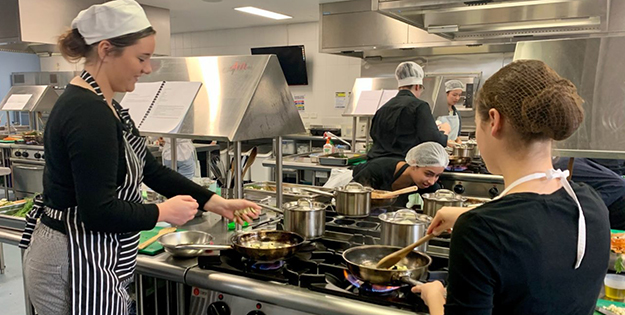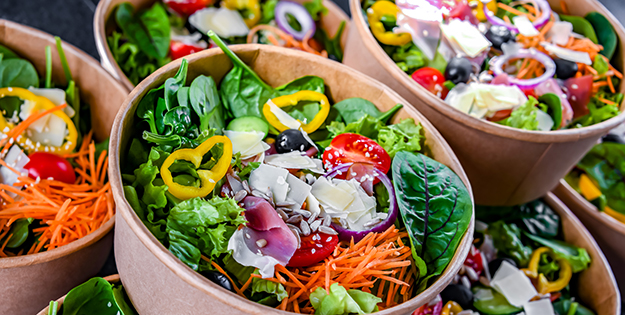Study
Copyright@ Australian Catholic University 1998-2026 | ABN 15 050 192 660 CRICOS registered provider: 00004G | PRV12008
Copyright@ Australian Catholic University 1998-2026 | ABN 15 050 192 660 CRICOS registered provider: 00004G | PRV12008

If you love food and the science around it, studying and working in the field of nutrition science might be very appealing. It can be a smart move for your future, too, with demand for qualified nutrition professionals increasing as people and communities around the world struggle to balance their diets and manage chronic disease.
We spoke with ACU Associate Professor of Nutrition and Dietetics Sharon Croxford about where a nutrition science degree could take aspiring nutritionists.
What types of careers could a nutrition science graduate apply for? What sort of skills will they be graduating with that would be put to good use in these careers?
“Our Bachelor of Nutrition Science allows students to go in slightly different directions to other nutrition and dietetics degrees. It has majors and minors, so you can tailor it to your interests, and we’ve deliberately focused on food science and culinary nutrition science. Culinary nutrition science is relatively new in Australia and most of our graduates now work in that practice area, with companies such as HelloFresh, David Jones Food, Dineamic and Scalzo Foods.
“Culinary nutrition takes students back to food and cooking so they can understand the interactions between food science, cooking and nutrition science. We want to ensure they’ve got skills across all three areas and can converse with their target group.
“Graduates working in culinary nutrition may be creating menus, promoting healthy meal plans, and developing recipes for meals that need to meet a particular nutrient profile. Many of these jobs are about creating healthy ready meals for different audiences, for example older Australians who are cooking less or younger adults who want to access prepared meals as part of a healthy diet.
“We also focus on giving students job-ready skills and the tools to promote themselves. Students can opt in to one or two work placement units – which is unusual, because not all nutrition science degrees offer this – and part of those units focuses on preparing students for work. For example, making sure they’ve got a profile on LinkedIn – a key networking platform for nutrition and dietetics.
“It is those adjacent skills as well as the nutrition science knowledge that are important for getting a job in the field. Project management, teamwork, flexibility, prioritising workloads – and the ability to understand your strengths and sell those to a potential employer.”

What’s the difference between a nutrition science degree and a dietetics degree? How does the choice of degree affect a graduate’s career outcomes?
“All dietitians are nutrition scientists but not all nutrition scientists are dietitians.
“Dietetic courses are accredited by Dietitians Australia (DA), and we’re currently going through that process for our Master of Dietetic Practice. All dietetic degrees must meet DA’s accreditation standards and courses must include a strong foundation in biosciences. It’s usually very competitive to get into dietetic study as it’s become a very attractive field.
“Most of the dietetic courses in Australia now are postgraduate. Students need to study an undergraduate course, then do postgraduate study to become an Accredited Practising Dietitian, or APD.
“Someone who studies an accredited dietetic practice course will get more education and training in certain areas, such as food services and food service management, as well as in-depth advocacy, community and public health nutrition. They also need to do more dietetic practice placement across a range of areas, including individual case management. That’s where a student learns how to take a diet history, use a medical nutrition lens to create a nutrition diagnosis, and work with an individual or healthcare team to create a dietary plan or intervention to address that medical issue.
“Nutrition scientists are not qualified in medical nutrition therapy. Nutrition science graduates can’t create dietary plans to treat disease or deliver individual case management, but they can create menus and healthy meal plans for individuals. In Australia, a nutrition scientist is not accredited. That said, nutrition scientists can work across lots of different areas – as health promotion officers, culinary nutritionists, food scientists, community development workers and health educators, for example.”
How much of a role does gaining practical experience with potential employees during the degree play in securing employment?
“It plays an enormous role. I came to ACU in 2019, and rewrote the course to introduce a culinary nutrition major and introduce work placement. We now have two work placement units: one with a minimum of 50 hours’ placement; the second with a minimum of 90 hours. Students can choose to do one or both. And it’s had a direct and positive impact on our graduates’ career outcomes.”

How can studying another degree alongside nutrition science, such as business, exercise and sports science, or psychological science, affect students’ career options?
“If a student does a double degree with business such as our Bachelor of Nutrition Science/Bachelor of Business Administration then goes on to nutrition and dietetics, they should be ahead of the curve as far as understanding the business side of things and how different parts of organisations work. There’s a lot of space in the food and nutrition world to set up your own thing, to be an entrepreneur, so hopefully this double degree provides students with that confidence to consider building something of their own.
“Our relatively new Bachelor of Exercise and Sports Science/Bachelor of Nutrition Science is for students interested in the sport and exercise area of practice, because nutrition and exercise are very tightly linked. If you want to be an elite athlete, you must know about how your body works when you’re exercising and how to feed it.
“Graduates of this double degree will be accredited sports and exercise scientists who are able to work across both of those areas. It’s designed to produce graduates who are ahead of the curve when it comes to working for sporting organisations or, again, who want to set up their own thing. A lot of people who work in the sports and exercise sector don’t have sound nutrition knowledge or expertise, so our graduates will be able to really help fill that gap.
“The Bachelor of Psychological Science/Bachelor of Nutrition Science, which we’ll launch in 2024 as the first double degree of its kind in Australia, is again something that’s very obvious. There’s an enormous link between someone’s mental health and their nutrient status and the other way around; nutrition affects mental health, and mental health issues can affect nutrient status.
“That said, a lot of psychologists do work in food and nutrition, and there are dietitians who work with people around their psychological challenges as they’re improving their nutrition, but there’s not a lot of formal overlap. Hopefully this double degree will slowly start to change that. After graduating, students will still need to do postgraduate study to become counsellors, psychologists or dietitians.”

Is moving into research (studying a master’s or research degree after completing your bachelor’s) a good move for nutrition science students?
“At ACU, we offer a Master of Dietetic Practice by coursework, but we don’t have a master’s degree that articulates to a PhD. We do offer an honours program – that’s the first year of a research pathway that can lead to a PhD. We have honours students that have come straight from undergraduate nutrition science study or after practising as a nutritionist or dietitian.
“The honours year is not always about finding your research passion, although you may get lucky. You do develop research skills, but it’s also about developing other skills such as in project management and the ability to better articulate what you’ve learnt. That can put you ahead of others when you’re going for employment.
“So an honours degree is definitely worth it. Some employers also offer a higher pay rate for employees who have done postgraduate study. It will give applicants a boost for many postgraduate dietetic programs as well.”
How relevant is a degree in nutrition science to the real world? How will it equip students for a secure and sustainable working future?
“A degree in nutrition is one of those things that’s transportable. Food and nutrition are universal – people have to eat. And there will always be challenges in supporting people as individuals, as well as populations, to eat well.
“Most students starting this degree have a very fixed idea about what it is and where it’s going to take them. They want to be a dietitian, and specifically a dietitian working in a hospital. That narrows their thinking, and very few graduates end up going down that pathway.
“But nutrition is the type of course that means you can work anywhere, do anything – if you think big enough. If you search nutrition scientist positions online, those are few and far between, but there’ll be one for a health promotion officer, one for a culinary nutritionist, one for a food scientist, one for a community development worker.
“With our degrees, we also build in online and in-country international experiences so that students can be exposed to different environments and realise they can broaden their career aspirations. I’ve taken students to the Solomon Islands and Bali, and we’ll take more to Rome this year. We hope that seeing different opportunities and immersing themselves in other countries and cultures will enable students to think more broadly about what they can do.”
Think study in nutrition science is for you? Discover more.
Copyright@ Australian Catholic University 1998-2026 | ABN 15 050 192 660 CRICOS registered provider: 00004G | PRV12008